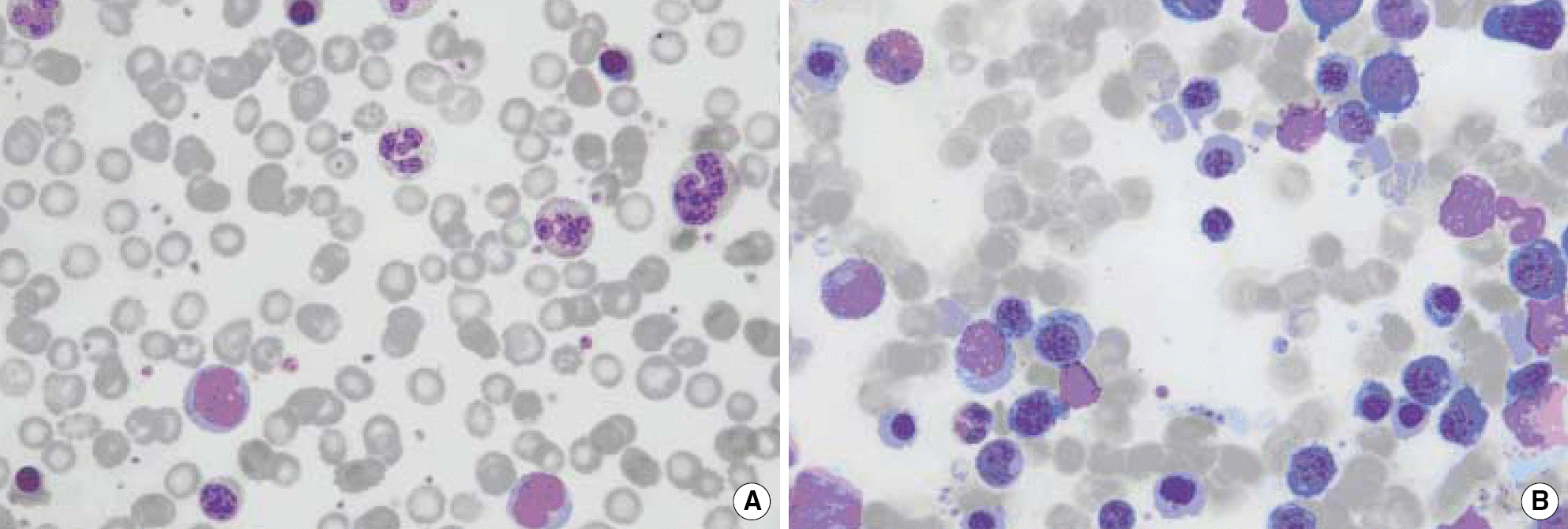Abstract
Although glucose-6-phosphate dehydrogenase (G6PD) deficiency is the most common enzyme disorder worldwide, it has rarely been reported among Korean. The patient was previously healthy 39 yr old male who showed severe hemolytic anemia and acute renal failure accompanied by hyper-bilirubinemia after hepatitis A infection. The additional studies for differential diagnosis of hemolytic anemia showed a moderate deficiency of G6PD enzyme. Because hepatitis A infection in patient with G6PD deficiency present much more severe clinical symptoms, G6PD enzyme should be examined in patients with triggering factors of hemolysis such as hepatitis A infection.
Go to : 
References
1. WHO Working Group. Glucose-6-phosphate dehydrogenase deficiency. Bull World Health Organi. 1989; 67:601–11.
2. Kim MK, Yang CH, Kang SH, Lyu CJ, Kim KY. Glucose-6-phosphate dehydrogenase deficiency-report of 4 cases. J Korean Med Sci. 1992; 7:71–5.
3. Yoon SK. Clinical significance of outbreak of hepatitis A virus infection in endemic area with hepatitis B and C virus infection. Korean J Gastroenterol. 2006; 47:173–5.
4. Lee DH, Kim JK, Chung HS, Ryu HJ, Moon SJ, Ahn SH, et al. A case of acute renal failure associated with acute fulminant hepatitis A. Korean J Nephrol. 2006; 25:103–8.
5. Berry E, Melmed RN. Infectious hepatitis and glucose-6-phosphate dehydrogenase deficiency. Isr J Med Sci. 1977; 13:600–3.
7. Chen EY, Cheng A, Lee A, Kuang WJ, Hillier L, Green P, et al. Sequence of human glucose-6-phosphate dehydrogenase cloned in plasmids and a yeast artificial chromosome. Genomics. 1991; 10:792–800.

8. The Korean Society for Laboratory Medicine. Laboratory Medicine (Clinical pathology). 3rd ed.Seoul: Korea Medical Book;2003. p. 225–7.
9. Frank JE. Diagnosis and management of G6PD deficiency. Am Fam Physician. 2005; 72:1277–82.
10. Lewis SM, Bain BJ, editors. Dacie and Lewis practical haematology. 10th ed.Philadelphia: Chrchill Livingstone;2006. p. 216–26.
11. Choi JA, Kim SY, Suh BK, Lee WB, Lee BC. A case of Glucose-6-Phosphate dehydrogenase deficiency with chronic Hepatitis B. J Korean Soc Pediatr Endocrinol. 1998; 3:90–5.
12. Tibble JA, Ireland A, Duncan JR. Acute auto immune haemolytic anaemia secondary to hepatitis A infection. Clin Lab Haematol. 1997; 19:73–5.

13. Beyazit Y, Guven GS, Kekilli M, Koklu S, Yolcu OF, Shorbagi A. Acute pericarditis and renal failure complicating acute hepatitis A infection. South Med J. 2006; 99:82–4.

14. Zikos D, Grewal KS, Craig K, Cheng JC, Peterson DR, Fisher KA. Nephrotic syndrome and acute renal failure associated with hepatitis A virus infection. Am J Gastroenterol. 1995; 90:295–8.
15. Urganci N, Akyildiz B, Yildirmak Y, Ozbay G. A case of autoimmune hepatitis and autoimmune hemolytic anemia following hepatitis A infection. Turk J Gastroenterol. 2003; 14:204–7.
16. Cakir B, Teksam M, Tarhan NC, Isiklar I, Tutar NU, Ozcay F, et al. Unusual MDCT and sonography findings in fulminant hepatic failure resulting from hepatitis A infection. AJR Am J Roentgenol. 2005; 185:1033–5.

17. Gotsman I, Muszkat M. Glucose-6-phosphate dehydrogenase deficiency is associated with increased initial clinical severity of acute viral hepatitis A. J Gastroenterol Hepatol. 2001; 16:1239–43.

18. Huo TI, Wu JC, Chiu CF, Lee SD. Severe hyperbilirubinemia due to acute hepatitis A superimposed on a chronic hepatitis B carrier with glucose-6-phosphate dehydrogenase deficiency. Am J Gastroenterol. 1996; 91:158–9.
19. Green J, Better OS. Systemic hypotension and renal failure in obstructive jaundice-mechanistic and therapeutic aspects. J Am Soc Nephrol. 1995; 5:1853–71.

21. Lee HS, Choi Y, Yu SH, Koh HI, Kim MJ, Ko KW. A renal biopsy study of hepatitis B virus-associated nephropathy in Korea. Kidney Int. 1988; 34:537–43.

Go to : 




 PDF
PDF ePub
ePub Citation
Citation Print
Print



 XML Download
XML Download